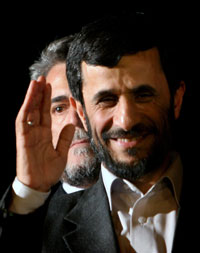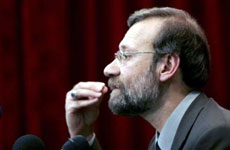|
EU Backs Off From Sending Iran to UNSC
 |
|
"The nuclear fuel cycle is a national demand," Ahmadinejad said. (Reuters)
|
Vienna,
September 22, 2005 (IslamOnline.net & News Agencies) - In what
could be seen a major positive step for the Islamic Republic of Iran,
the European Union backed off from immediately calling Tehran before
the UN Security Council over its nuclear program, according to a draft
UN resolution.
The
draft, read by Agence France-Presse (AFP), "requests"
International Atomic Energy Agency director general Mohamed ElBaradei
to report on Iran's nuclear program "to the IAEA board (of
governors) which will address the timing and content" of a report
on Iran's nuclear program that could apparently be given to the
Security Council, although the Council's name is not mentioned.
The
EU earlier in the week had been calling overtly for immediate referral
to the Council but this was opposed by Russia, China and non-aligned
nations on the IAEA's 35-nation board of governors, which is meeting
in Vienna this week.
Destructive
Response
Earlier
Thursday, Iranian President Mahmoud Ahmadinejad warned that any
country considering attacking the Islamic republic faced a
"destructive and fiery" response.
"Our
enemies have understood that we are very serious in defending our
security," said Ahmadinejad, during an annual parade of troops,
ballistic missiles and other hardware that marks the start of
"Sacred Defense Week" -- the anniversary of the outbreak of
war with Iraq in 1980, reported Agence France-Presse (AFP).
"Our
nation wants peace, stability, justice and equality in international
relations. We have always sought friendly relations with other
countries. Our nation wants the well-being of other countries and will
not do anything against their national interest.
"We
want the Persian Gulf to be a gulf of friendship and equality,"
Ahmadinejad said in a speech at the start of the parade, being staged
in the south of the capital near the shrine of Iran's late Islamic
revolutionary leader Ayatollah Ruhollah Khomeini.
But
he warned that "if some want to again test what they have tested
before, the flame of the Iranian nation will be very destructive and
fiery."
"Relying
on our nation and armed forces, we will make the aggressor regret
their actions," Ahmadinejad warned, telling Iran's army to
"prepare their defensive readiness" and calling for an
"expansion of the defense industries and the utilization of the
latest technology".
Raising
Stakes
 |
|
Larijani warned Iran might be forced to quit the NPT altogether. (Reuters)
|
Ahmadinejad's
warnings came in the middle of the intensifying crisis with the United
States and European Union over its nuclear program and followed
threats by top nuclear negotiator of tougher measures if the file is
referred to the UN Security Council.
The
UN nuclear watchdog, the International Atomic Energy Agency (IAEA) was
expected to hold a delayed crucial meeting Thursday to decide on
whether to send the file to the Security Council.
On
Tuesday, top nuclear negotiator Ali Larijani vowed to respond to being
hauled to New York by limiting UN inspections and resuming
ultra-sensitive uranium enrichment work itself.
He
even warned that Iran might be forced to quit the NPT altogether.
Ahmadinejad
insisted Wednesday that Iran was determined to master the nuclear fuel
cycle, although he said it does not want a confrontation with the
West.
"The
nuclear fuel cycle is a national demand," he told a cabinet
meeting, the student news agency ISNA reported. "It will take
Iran to a higher level of development but the Western powers do not
want that."
No
Bluff
Observers
believe Iran does not appear to be bluffing this time.
"The
regime does not appear to be bluffing this time," judged a
Tehran-based Western diplomat, according to AFP.
"The
hardliners are in charge here, the Americans are bogged down in Iraq,
oil prices are sky high. So the regime is in a strong position to
weather any crisis and the consequences of carrying on regardless.
It's that simple."
"The
very hard reaction of the three Europeans to the president's
initiative has convinced us that there is very little future in the
negotiations," Ali Agha Mohammadi, a national security spokesman,
told AFP.
"We
are at a moment of truth," he said.
Analysts
see Iran highly equipped with massive national support, strong and
well-established economic, military and political institutions, making
it hard to give in to foreign pressures to give up what the regime
sees as a legal right under the terms of NPT.
British
Foreign Secretary Jack Straw has also appealed to Iran to change its
mind on pursuing uranium enrichment at an unannounced meeting with his
Iranian counterpart, according to Reuters.
Iranian
Foreign Minister Manouchehr Mottaki requested the meeting Wednesday at
UN headquarters as the board of the world nuclear watchdog was
debating in Vienna a European resolution to refer Tehran's nuclear
program to the Security Council.
"The
foreign secretary urged Iran even at this late stage to take the
opportunity to come into compliance," a British spokesman told
Reuters after the Straw-Mottaki meeting.
Mottaki
questioned why Britain thought it was necessary to press for a
referral when his country had acted entirely legally, a British
official said.
The
EU and the United States have failed to convince key nuclear powers
Russia and China, as well as many nonaligned countries, to back the
draft resolution.
Iran
insists its fuel cycle ambitions are strictly peaceful and a right as
a signatory of the NPT.
The
Islamic Republic has rejected demands from the European Union and
United States that it abandon its enrichment program in exchange for
incentives, and last month partially ended a freeze on
enrichment-related work.
|